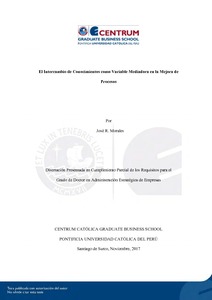| dc.contributor.advisor | Chión Chacón, Sergio Julio | |
| dc.contributor.author | Morales, José R. | |
| dc.date.accessioned | 2018-03-23T23:00:27Z | |
| dc.date.available | 2018-03-23T23:00:27Z | |
| dc.date.created | 2017 | |
| dc.date.issued | 2018-03-23 | |
| dc.identifier.uri | http://hdl.handle.net/20.500.12404/11646 | |
| dc.description.abstract | Esta investigación se enfoca en el rol mediador que ejerce el intercambio de conocimientos
entre la cultura organizacional, la estructura organizacional y la infraestructura tecnológica
con la mejora de procesos. Pretende explicar por qué muchas organizaciones tienen éxito
al momento de implementar programas de mejoras y otras no. Adopta un enfoque
cuantitativo mediante la ejecución de ecuaciones estructurales estimadas a través de la
función de máxima verosimilitud para una muestra de 200 empresas de los sectores
productores de alimentos, bebidas y textiles en el Ecuador. Los resultados sugieren que el
intercambio de conocimientos media de manera total la relación entre la cultura y la
estructura organizacional con la mejora de procesos, así como que en el Ecuador estas
empresas no adaptan sus tecnologías de información a la administración del conocimiento.
Los principales hallazgos indican que tanto la cultura organizacional como la estructura
organizacional impactan directa y significativamente en el intercambio de conocimientos e
indirecta y significativamente sobre la mejora de procesos | es_ES |
| dc.description.abstract | This research focuses on the mediating role of knowledge sharing between
organizational culture, organizational structure and technological infrastructure with
process improvement. It aims to explain why many organizations are successful when
implementing improvement programs and others are not. This study adopts a quantitative
approach through the execution of structural equations estimated through the maximum
likelihood function for a sample of 200 companies from the food, beverage and textile
sectors in Ecuador. The results suggest that knowledge sharing completely mediates the
relationship between culture and organizational structure with process improvement, as
well as the fact that in Ecuador these companies do not adapt their information
technologies to knowledge management. The main findings point out that both the
organizational culture and the organizational structure directly and significantly impact the
exchange of knowledge and indirectly and significantly on the improvement of processes | es_ES |
| dc.language.iso | spa | es_ES |
| dc.publisher | Pontificia Universidad Católica del Perú | es_ES |
| dc.rights | info:eu-repo/semantics/openAccess | es_ES |
| dc.rights.uri | http://creativecommons.org/licenses/by-nc-nd/2.5/pe/ | * |
| dc.subject | Aprendizaje organizacional | es_ES |
| dc.title | El Intercambio de Conocimientos como Variable Mediadora en la Mejora de Procesos | es_ES |
| dc.type | info:eu-repo/semantics/doctoralThesis | es_ES |
| thesis.degree.name | Doctor en Administración Estratégica de Empresas | es_ES |
| thesis.degree.level | Doctorado | es_ES |
| thesis.degree.grantor | Pontificia Universidad Católica del Perú. CENTRUM | es_ES |
| thesis.degree.discipline | Administración Estratégica de Empresas | es_ES |
| renati.advisor.dni | 08240294 | |
| renati.advisor.orcid | https://orcid.org/0000-0002-7955-3163 | es_ES |
| renati.discipline | 413038 | es_ES |
| renati.level | https://purl.org/pe-repo/renati/level#doctor | es_ES |
| renati.type | http://purl.org/pe-repo/renati/type#tesis | es_ES |
| dc.publisher.country | PE | |
| dc.subject.ocde | https://purl.org/pe-repo/ocde/ford#5.02.04 | es_ES |






